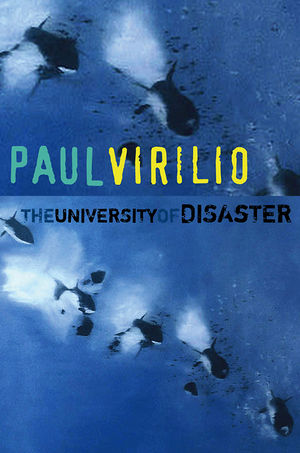
«The world of the future will be a tighter and tighter struggle against the limits of our intelligence», announced Norbert Wiener… On top of such confinement, today we are faced not only with the greenhouse effect of global warming but also that of incarceration within the tighter and tighter limits of an accelerating sphere, a dromosphere, where depletion of the time distances involved in the geodiversity of the Globe rounds off the depletion of the substances produced by biodiversity. An unanticipated victim of this geophysical foreclosure is science – not only biology but also physics, the «Big Science» now confronted by the space-time contraction of the known world and of knowledge once acquired here below. Whence the threat, still unnoticed, of an accident in knowledge which will double the accident of polluted substances and put paid to this crisis of reason denounced by Husserl, with the extravagant quest for a substitute exoplanet, a new «Promised Land» to be colonised as swiftly as possible; the climate necessary to the life of our minds, as much as to the life of our bodies, from then on, on this old Earth of ours, being like the fatal consequences of a long illness requiring hospitalisation.
The most influential book of the past seventy-five years: a groundbreaking exploration of everything we know about what we don’t know, now with a new . . .
«Kanskje finnes det for latteren ennå en fremtid!», skriver Nietzsche i åpningen av Den muntre vitenskapen. Med satire og skarpe iakttakelser legger han blant annet . . .
Hvorfor gjør vi feil? Og hvorfor i all verden fortsetter vi å gjøre de samme feilene gang på gang? Vi tenker i ett av to . . .
«The planet is sick. Human beings are guilty of damaging it. We have to pay. Today, that is the orthodoxy throughout the Western world. Distrust . . .
Virilio’s exploration of the relationship between technology, war and information technology. “Civilization or the militarization of science?” With this typically hyperbolic and provocative question as . . .
With this book Paul Virilio inaugurated the new science whose object of study is the «dromocratic» revolution. Speed and Politics (first published in France in . . .
The Believing Brain is bestselling author Michael Shermer’s comprehensive and provocative theory on how beliefs are born, formed, reinforced, challenged, changed, and extinguishedSynthesizing thirty years . . .
«Verden er min forestilling.» Med denne påstanden innleder Schopenhauer sitt hovedverk fra 1818. Alt som kan erkjennes, er objekt for et subjekt. Omvendt gjelder det . . .
Michel Foucault takes us into the first two centuries of our own era, into the Golden Age of Rome, to reveal a subtle but decisive . . .
In this sequel to The History of Sexuality, Volume I: An Introduction, the brilliantly original French thinker who died in 1984 gives an analysis of . . .
Michel Foucault offers an iconoclastic exploration of why we feel compelled to continually analyze and discuss sex, and of the social and mental mechanisms of . . .
There is a catastrophe within contemporary art. What I call the «optically correct» is at stake. The vision machine and the motor have triggered it, . . .
“One day the day will come when the day will not come.” Bleak in its analysis of the social destruction wrought by modern technologies of . . .
Massive technological innovations now allow scientists to extract and analyze ancient DNA as never before, and it has become clear–in part from David Reich’s own . . .
‘Hinsides godt og ondt’ er en hyllest til livet og kreativiteten og på mange måter et endelig farvel med metafysikken. I åpningen sier Nietzsche at . . .
Taboo and sacrifice, transgression and language, death and sensuality—Georges Bataille pursues these themes with an original, often startling perspective. He challenges any single discourse on . . .
How would it be if what we take for human advance were simply a technological progress that literally leaves us out of its equations? What . . .
A trenchant critique of new techniques of waging war, and its reduction to images on a screen Written with his characteristic flair, Virilio’s latest book . . .
With around 645 million people expected to be displaced Ð by wars and other catastrophes Ð by 2050, Virilio begins The Futurism of the Instant . . .
The underlying premise of all of Virilio’s work is that we must analyzespeed and acceleration throughout history and see it as constitutive of historicalepochs. Continual . . .